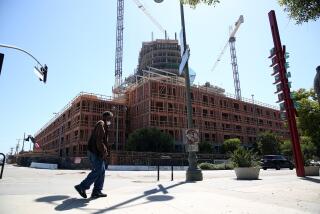Foreclosure settlement not likely to lift home builders’ stocks
The $25-billion foreclosure settlement between the government and major banks might lift the U.S. housing market over time.
Just don’t expect it to lift the stocks of U.S. home builders.
Despite generally encouraging news for the industry lately — an improving economy, rising stock prices and excitement over the spring home-buying season — many analysts advise investors to stay away from shares of builders.
In each of the last six years, stocks of builders such as KB Home, Lennar Corp. and Toll Bros. have risen in the months leading up to home-buying season, which begins about now. But they’ve fallen, sometimes sharply, once the actual selling period got underway — and analysts expect that scenario to play out again this year.
“I don’t think the stocks are just going to continue on a tear for the next six months or a year,” said Michael Smith, an analyst at JMP Securities in San Francisco. “At some point you’ll see the stocks come in significantly.”
In an annual phenomenon dubbed the “Hope Trade,” enthusiastic investors pile into home builders in the fall on the assumption that sales will be strong the following year. The buying typically starts when home sales, and stock prices, are at seasonal lows.
But each of the last five rallies petered out around mid-February. As expectations of a housing recovery subsided, investors got jittery and cashed in their profits.
“Whether one calls it the ‘Hangover Trade,’ the ‘Heartburn Trade’ or the ‘Reality Trade’ — the recent track record suggests this calendar period is not a particularly good time to initiate new positions in home builders,” Buck Horne, an analyst at Raymond James & Associates, wrote in a report this week in which he downgraded the sector.
Such concerns are heightened this year because the home builder sector has been surging amid signs that a housing recovery is at least within sight.
The Standard & Poor’s mid-cap home-building index has jumped 50% since early October, more than double the corresponding 22% gain in the S&P 500 index. The builder index has climbed 8% this month amid anticipation of the massive foreclosure settlement.
Shares of some home builders have shot up dramatically in the last six weeks. Los Angeles-based KB Home has jumped 74% this year, PulteGroup Inc. is up 39% and Westlake Village-based Ryland Group Inc. has gained 29%.
Analysts say that’s too much, given the industry’s underlying prospects. Such skepticism may have contributed to the sector’s 1.8% drop Friday, which was nearly triple the decline in the S&P 500 index.
New-home sales are expected to climb this year. The National Assn. of Home Builders predicts a 16% jump to 706,000 units this year. Some analysts are more subdued, predicting a mid-single-digit percentage gain.
Even at the lower estimate, it appears the building industry is recovering, analysts say, but not enough to warrant the share prices. Housing starts peaked in 2005 at 2.1 million units.
“The real question is how healthy and sustainable is the recovery?” said Jack Micenko, an analyst at Susquehanna International Group in New York. “Stocks have priced in a very strong recovery, and we’re not convinced at this point.”
The landmark foreclosure settlement between five major banks and state and federal governments could boost the housing market by helping struggling homeowners and easing foreclosures, analysts say. But it’s unlikely to have an immediate effect on the new-home market, in part because buyers considering new homes typically don’t consider foreclosure properties.
“It seems to be a fairly hollow victory for housing bulls,” Micenko said. “It’s an incremental positive, but it’s not a reason to go out and buy housing-related names.”
One problem for builders, he said, is the reluctance of potential buyers, especially younger people, to purchase homes in a soft employment market.
And prospective borrowers are having problems qualifying for mortgages. Banks are hesitant to lend to all but the most creditworthy applicants, Micenko said, for fear of suffering losses or having to buy back loans from investors.
“The stocks right now suggest that everyone living in their parents’ basement will go out and buy a house as soon as they get a job,” Micenko said. “That doesn’t happen with tight standards.”






